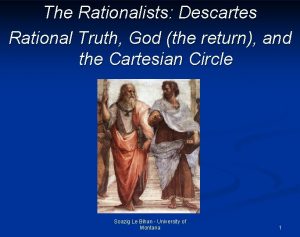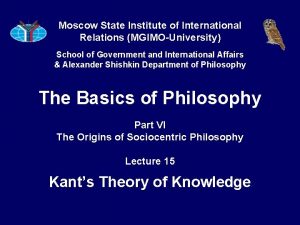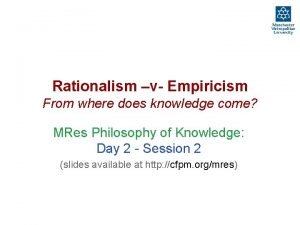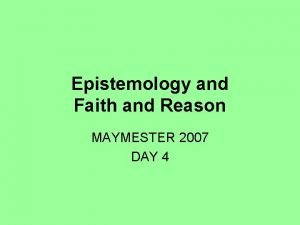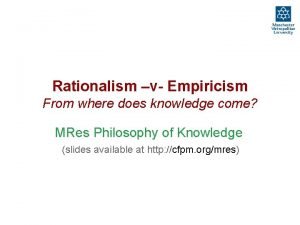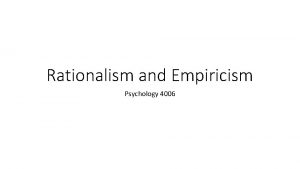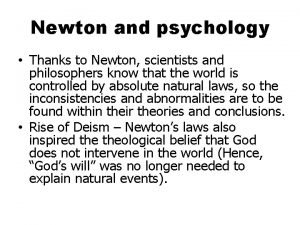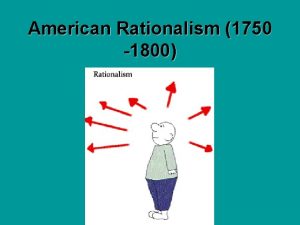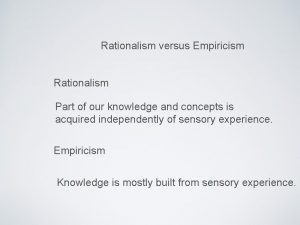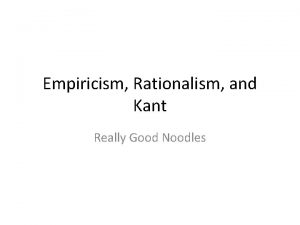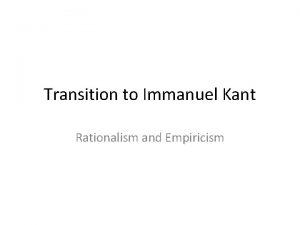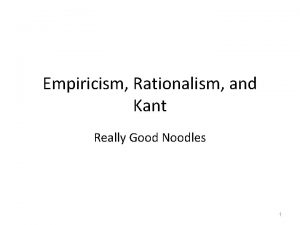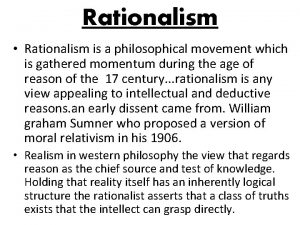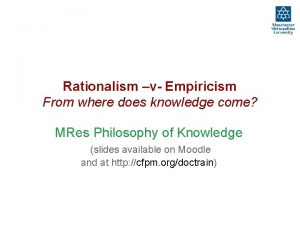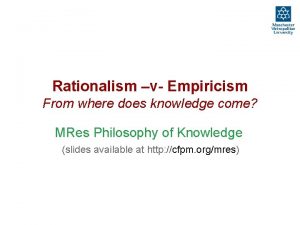Rationalism and Empiricism Psychology 4006 Whats The Deal















- Slides: 15

Rationalism and Empiricism Psychology 4006

What’s The Deal With Rationalism? • “Rationalism” is derived from the Latin “ratio” meaning to reason. • Rationalism emphasizes: • a priori knowledge • an active mind, acts upon sensory input • deductive arguments, using logic to demonstrate that the premises of an argument provide definitive grounds for the conclusion

Descartes Was a Rationalist • René Descartes (1596 -1650) applied his mathematical approach to philosophy in his development of a rational system. • The four parts of his method are as follows. • Never accept anything as true unless it is clear, distinct, and immune from doubt. • Divide all difficulties into as many parts as possible. • Start with the easiest and simplest elements and then proceed to the complex. • Keep complete notes and comprehensive reviews so nothing is omitted.

OK, So That Pineal Gland Thing, That’s Wrong…. • Descartes argued that the mind-body interaction particular to humans takes place in the pineal gland. • Additionally, Descartes provided the following testable hypotheses for future researchers. • Muscles are literally inflated by animal spirits. • The muscular system is tied to the ventricles of the brain, the source of animal spirits. • Nerves have both sensory and motor functions. • Nervous transmission is extremely fast.

Descartes Was Important, but • That mind body thing, that’s a crock. • The pineal gland thing is funny • When reading his stuff it is hard to tell when he means ‘your immortal soul’ and when he means ‘your mind’. • He also wore a ridiculous hat (I’m guessing)

Empiricism • Empiricism is closest to the term “experience. ” • Empiricists share some common ideas: • a posteriori knowledge, • a passive mind that responds to sensory input • Induction as a method of knowledge.

No Bacon, No Science • Francis Bacon ( 1561 -1626) focused on problems of knowledge and pioneered the scientific method. • He described four Idols that are impediments to human knowledge. • Idols of the Tribe are the limits of the human intellectual apparatus. • Idols of the Cave are the prejudices or preferred theories that blind us to alternative explanations. • Idols of the Marketplace are aspects of the nominal fallacy. • We often believe that we have explained a phenomenon by giving it a name. • Idols of theatre are the tendencies of humans to accept the claims of authorities.

Bacon’s Empiricism Should Sound Familiar • His hat game was strong. • Bacon emphasized sense experience in the search for knowledge. • He advocated the gathering of observations from a wide variety of sources. • He recommended presentation of these observations to a community of researchers.

John Locke and the Tabula Rasa • John Locke (1632 -1704) argued that the mind is a “white paper” (tabula rasa) at birth. • He concluded that all knowledge is learned through experience. • He criticized the concept of innate ideas. • His emphasis on experience led him to recommendations for education. • Locke had a profound effect on two centuries of childhood education, particularly by encouraging hardening. • Looked like Golda Mier

David Hume • Not going to say anything about that thing on his head. • Hume (1711 -1776) maintained that our experience is simply a chain of events. • Causality/relationships are functions of mental habits • Hume argued that our selves and our experiences are not as continuous as we would like to believe. • Hume studied the emotions extensively. • He advocated comparative studies in physical anatomy and “anatomy of the mind. ”

Utilitarianism • Utilitarianism was motivated by practical problems in education and society. • Mary Wollstonecraft (1759 -1797): an early pioneer for the emancipation of women. • She suggested that the differences between the genders resulted from the lack of opportunities for women. • Wollstonecraft argued against essentialism. • Essentialisms is the belief that the essential nature of men is qualitatively different from the essential nature of women. • She encouraged men to interact with women as equals.

Utilitarianism • James Mill (1773 -1836) argued for a mechanistic approach to the mind based in association and conditioning. • He was an advocate for education for the masses. • John Stuart Mill (1806 -1873) shared a mechanical approach to education. • Viewed the mind as probabilistic rather than mechanical. • Maintained that a science of psychology was possible. • Suggested a science of the development of character. • Advocated feminist views. • Grounded his views in empiricism and utilitarianism. • Suggested societal benefits from providing women with opportunity.

As An Aside • JS Mill’s hair was done by the same guy who did Bernie Sanders’s hair, while Mary Wollstonecraft was the only normal looking philosopher, ever.

Kant is in the middle, but hard to read • Immanuel Kant (1724 -1804) sought a middle ground between empiricism and rationalism. • Kant believed that knowledge begins with sensory experience. • But, the mind uses innate categories of understanding to make our experience intelligible. • An interactionist really • He argued that humans are caught in the tension between heteronomy (government from the outside) and autonomy (self-government). • Self-government plays a role in our ability to act in a moral manner.

Conclusion • The Empiricists really were probably the most influential of all of the philosophers, as far as psych goes. • But, Kant’s approach is probably the closest thing to how people think today, most of us anyway.
 Rational truth
Rational truth Empiricism
Empiricism Rationalism v empiricism
Rationalism v empiricism Empiricism vs rationalism
Empiricism vs rationalism Rationalism examples
Rationalism examples Where does knowledge come from
Where does knowledge come from Rationalism is to ____ as empiricism is to ____
Rationalism is to ____ as empiricism is to ____ Deal or no deal machine
Deal or no deal machine Rudolf vizental
Rudolf vizental Whats rationalism
Whats rationalism Rationalism psychology
Rationalism psychology Tbtak
Tbtak Tübitak 4006 poster örnekleri
Tübitak 4006 poster örnekleri Tübitak 4006 ödenek harcama beyanı
Tübitak 4006 ödenek harcama beyanı Tübitak 4006 fatura örneği
Tübitak 4006 fatura örneği Tübitak 4006 başvuru sonucu öneri ne demek
Tübitak 4006 başvuru sonucu öneri ne demek
